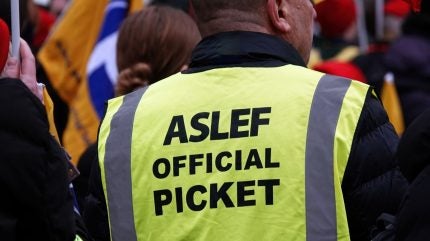
The UK could be reaching the end of two years of strike action on its railways as the ASLEF train drivers union settles a dispute with rail operator LNER and nears a vote on a new pay offer.
The union had been set to begin industrial action against LNER for every weekend through to November over alleged “broken agreements” from the state-controlled operator but said it had now called off the action after reaching a resolution.

Discover B2B Marketing That Performs
Combine business intelligence and editorial excellence to reach engaged professionals across 36 leading media platforms.
Mick Whelan, general secretary of ASLEF, said: “Once again we have demonstrated that by sitting round the table and negotiating, issues on the railway can be resolved in a way that means better workplace practices for rail workers and a better service for the travelling public.”
The short-lived dispute with LNER had threatened to extend the union’s strike action yet again despite the impending vote on a pay offer agreed on between ASLEF and rail operators earlier in August, separately to the most recent LNER issues.
The 4.5% pay rise for the 2024/2025 season would also include a backdated 5% pay rise for 2022/2023 and a 4.75% rise for 2023/2024 and has been recommended by the union to its 23,000 strong membership in a breakthrough for the industrial relations in the sector.
Disputes between the country’s rail operators, represented by the Rail Delivery Group (RDG) and its two primary rail unions, ASLEF and the RMT union, began in 2022 when negotiations between the organisations first fell through.

US Tariffs are shifting - will you react or anticipate?
Don’t let policy changes catch you off guard. Stay proactive with real-time data and expert analysis.
By GlobalDataThe following years saw thousands of rail workers across the country take part in strike action as talks continued to fail to find a solution and new issues arose, such as a proposal to close ticket offices, leading the UK government to introduce a controversial minimum service law.
Now, the recent progress on an offer for ASLEF and rumours of a similar incoming deal for RMT means that the two-year dispute could soon be over, with the end of strikes one of the priorities outlined by the Labour government, alongside the nationalisation of the country’s rail operators.
Transport Secretary Louise Haigh said the ASLEF pay offer meant the end was in sight for the national rail strikes, she said: “If accepted, this offer would finally bring an end to this long-running dispute and allow us to move forward by driving up performance for passengers with the biggest overhaul to our railways in a generation.”
Some issues may still persist though with train drivers working on the London Underground still seeking a deal with Transport for London (TfL) and Whelan committing to continue campaigning for an end to the reliance on “excessive use of driver overtime” in the understaffed industry.
One of the country’s other rail unions TSSA also warned that while it had ended strike action planned on the underground, its own dispute with TfL persisted and it was still awaiting a pay offer for its national membership as well, despite allegedly “misleading” communication from RMT about its newest offer.





